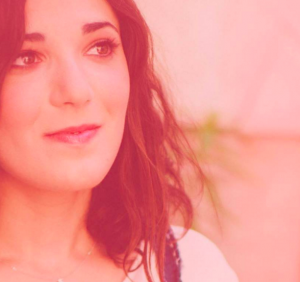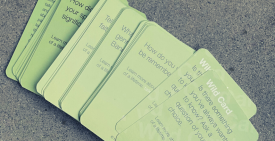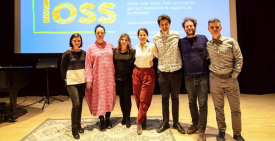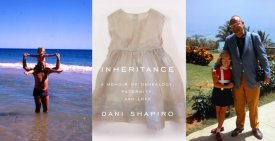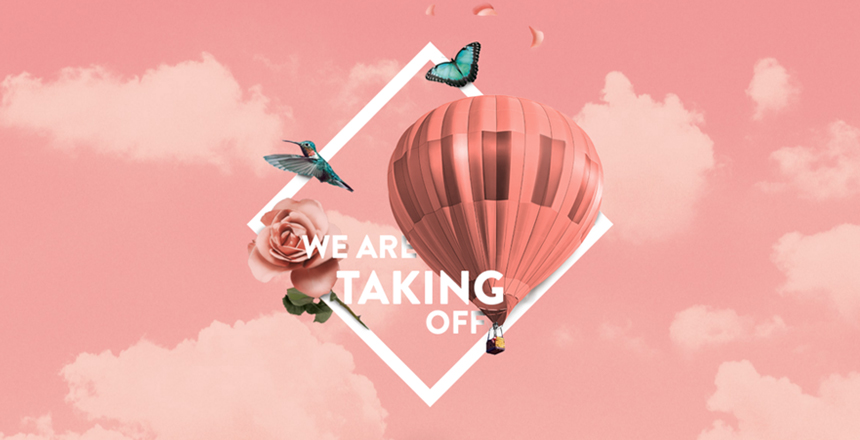
Modern Loss brings you a conversation with Emily Kramer-Golinkoff, 30-year-old co-founder of Emily’s Entourage, a non-profit that raises money to help find a cure for Cystic Fibrosis (CF), with a focus on rare mutations often left behind by mainstream research.
Modern Loss: Could you describe a little bit of your experience with CF?
Emily Kramer-Golinkoff: CF is a progressive, fatal genetic disease that primarily affects the lungs and digestive system. So what happens is that this really thick, sticky mucous builds up in my lungs and causes these life-threatening lung infections. And so I spend 3-4 hours every day doing treatments to help control the infections that are always in my lungs. I also take tons of pills and do insulin injections for my CF related diabetes every day. That’s my baseline treatment when I’m healthy, and when I’m really sick I go in the hospital for IV antibiotics to really bring out the big guns.
ML: Wow, I didn’t know CF-related diabetes was a thing.
EK: Yeah, (laughs), it really is the disease that keeps on giving. As people are living longer with CF, we’re learning more about it. Historically it was thought to be mostly a lung and gastrointestinal disease, but really there are very few organ systems that are not affected, but CF related diabetes is probably the biggest co-morbid disease, so about half of CF patients over the age of 18 have it.
ML: Do you remember when you found out you had CF?
EK: I actually get this question all the time. I mean, the way my parents handled it, it wasn’t like they revealed it to me one day; like it was this big secret or something to be ashamed of. It was more something I always knew. Like: I have brown hair, I have CF, I brush my teeth. It was just a fact.
CF treatments have fortunately advanced quite a bit in my lifetime. When I was little my parents literally used to pound on my back to try to move the mucous in my lungs, and they had to integrate that into their everyday life. We have pictures from when I was a little kid of my mom pounding on my chest in the store. She used to get some really weird looks doing that. That was all well and good until I was about to go to college and wasn’t going to have my parents there to do my treatments. Luckily, by then there was a version of the therapy vest available, which fills with air and vibrates to help clear out my lungs. It allowed me to be independent and not rely on my parents or anyone to do these treatments for me.
ML: Your organization, Emily’s Entourage, is focused on developing treatments for specific kinds of CF. Tell us more about that.
EK: Of course! There have been really big breakthroughs in treatment in the past couple years, but they only affect certain groups of people living with CF. There are over 1900 genetic mutations that cause the disease. Most research is done on the most common mutations, which together only represent half the population, so new treatments being developed aren’t effective for all of us. I happen to have two copies of an extremely rare mutation, and there haven’t been many advancements, or really much research, for me or people like me.
As my disease was getting worse, it motivated me, my family and my friends. We realized we were running out of time, and that it was really up to us to, well, change my fate. That if we weren’t going to do it, no one was going to, at least not on the timeline we needed.
So in late 2011 we started Emily’s Entourage. Our organization’s main goal is to fast track and fund research for rare mutations like mine. We’ve raised over $1.5 million, organized scientific symposia, and we’ve really been leaders in this small slice of science and medicine. And that’s exhilarating and gratifying, but I really wish we weren’t the leaders. I wish there were organizations out there doing and raising more. It’s really scary knowing that we’re it, that it’s up to us. It’s a big responsibility to know the hope for your future lies in your hands, especially as I feel myself getting sicker. So it’s empowering, but also really terrifying.
A lot of times, especially in medicine, people feel like they have to accept their fate, in terms of what their treatment options are and which direction research is headed. Part of what we’re trying to do as an organization is challenge that narrative, to question it. We’re showing it’s possible, and sometimes necessary, to get up and advocate on your own behalf, because you can’t just trust that other people will do it for you.
Related
ML: What’s it like being the face of your own organization?
EK: (Laughs) It’s actually a pretty uncomfortable role for me. I wouldn’t naturally be inclined to talk about myself this way, broadcast my struggles and journey with CF. But I think the storytelling aspect is what really makes people want to be involved in this organization. Every time I give people an inside glimpse, the outpouring of support increases in an amazing way. The more I open up [about] my life, the more people open themselves up. So even if being [so] public in this way isn’t natural for me, it’s still been an incredibly positive experience.
The foundation is really a family effort. I have three younger siblings, and the organization has been a really good way for them to feel like they’re supporting me. There’s not much they can do to help with my treatments, and there’s a limited number of things that they can do to feel like they’re being supportive of me. So I think being involved in the organization has been cathartic, a healthy way to channel all the anticipatory grief and fear that you feel when you’re confronted with a terminal illness.
Emily’s Entourage also has a big Instagram presence, which is a great way to shine light on the inner workings of my life people wouldn’t normally get to see. I’m fascinated by how interested even the non-CF community is in the minutiae of my life and treatments. We use it as a laboratory to find out what people are interested in seeing, what they want to learn more about.
ML: Is sharing your narrative ever challenging? The general public isn’t always comfortable discussing terminal illness.
EK: There definitely isn’t a huge appetite for conversations about death and serious illness out there. And there is this perception that any time you veer from 100 percent optimism, that’s a sign that you’re depressed or you’re not fighting. There’s kind of a judgment around that. We all deal with tough issues [differently]. I’m a realistic person. An optimistic realist, I guess. I’ve never had anyone react badly to me talking about my disease, but there’s an internal pressure from myself to come across as positive when I’m sharing my story.
I don’t talk about dying to most of my family and friends often. I probably think about it more than the average person and it weighs on me, but it doesn’t consume me. It can’t. It would be paralyzing.
But there’s no doubt that having a progressive fatal illness does make me pressured. I’m working against a ticking clock and I feel that with every breath I take. That brings a drive to do the things I want to do in life RIGHT NOW — and people certainly feel that. I also try to live deliberately. I try to be present. I think about my legacy for my family. I try to make sure my life reflects my priorities, that the people I love most know it. I don’t wait. The things I want, I pursue vigorously — with intensity, urgency and all my heart.
ML: How do the private conversations you have about CF differ from the public ones?
EK: One of the great things about living in the Internet age is that I’ve been able to connect with this thriving online CF community that would be completely impossible to replicate in real life. A lot of people don’t know is that people with CF aren’t supposed to meet. There can’t be conferences for us because we can’t be in the same room with one another. We’re vulnerable to opportunistic infections, and the chance that we’ll cross-infect each other with different strains of bacteria is too high.
Facebook is great for those kind of groups because they can be private, secret. That’s where we have the most intimate and substantive conversations. Those communities are a safe haven for having the side of the conversation that the healthy side of the population isn’t always open to having.
I’m grateful that if I have to be going through this experience, that I get to do it in this time, when we have all these ways to virtually connect. Especially as I’m less able to venture out and deal with the world in a physical way, it’s incredible to have this virtual world at my fingertips with people who are going through what I am.
I have deep online relationships with people with CF, and that’s where I feel most free to talk honestly about the reality of our disease, which is not rainbows and sunshine. There’s a mutual understanding that being realistic is healthy, that it’s not a sign of depression or that you’ve given up. The future can go in lots of different ways, and I think it’s important to think about all of them. My online CF friends are the people with whom I can most comfortably talk about death. We can talk with a frankness that is refreshing. We can be realistic and honest, plan for the future, share our fears and wishes. Those relationships are a lifeline for me.
ML: What’s coming up for Emily’s Entourage?
EK: Our annual fundraising gala is December 5 in Philadelphia. It’s going to be amazing, with nearly 500 people. It’s definitely not your average prissy, white tablecloth, sit-down, black tie affair. We keep it fun and mission-driven with activities that people can really participate in and engage in with their bodies. There’s a special energy in the room, so I’m really looking forward to that this year.
ML: What can people do to help?
EK: We are a volunteer-driven organization. Obviously the biggest and easiest thing people can do is donate, but we need people with skills such as fundraising expertise or just time they want to give us. We’re open to different type of fundraisers and new ideas!
Emily Kramer-Golinkoff is a patient advocate, speaker, and co-founder of Emily’s Entourage. You can follow Emily’s Entourage on social media here, and donate here. Tickets for their annual gala on Saturday, December 5 are available here.
Interview has been edited for length and clarity.
Top Image: Image courtesy of Emily’s Entourage.





